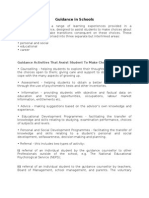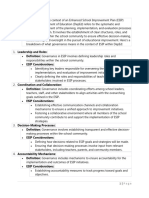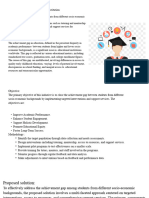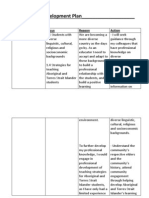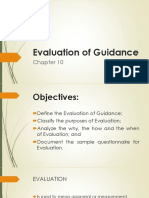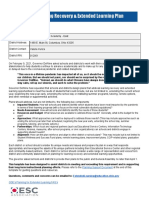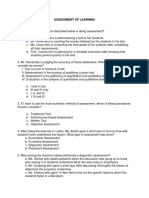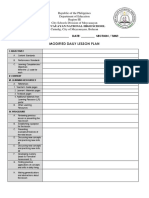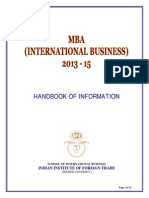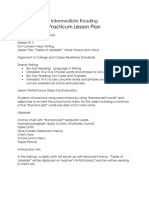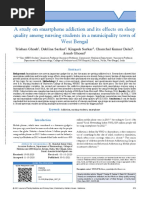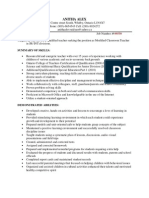Week Two - Minor Assignment
Week Two - Minor Assignment
Uploaded by
M ICopyright:
Available Formats
Week Two - Minor Assignment
Week Two - Minor Assignment
Uploaded by
M IOriginal Title
Copyright
Available Formats
Share this document
Did you find this document useful?
Is this content inappropriate?
Copyright:
Available Formats
Week Two - Minor Assignment
Week Two - Minor Assignment
Uploaded by
M ICopyright:
Available Formats
Minor Assignment Week Two
Name: _Musfirah_______________________________________
Date: __September 16, 2024_______________________________________
1) Identify the four renewed goals of the Ministry of Education.
1. Achieving excellence: The ministry implemented the Child Care and
Early Years Act, expanded licensed child care spaces, increased high
school graduation and EQAO achievement rates, extended teacher
education to two years, initiated the $150 million Technology and
Learning Fund, and provided additional math training for over 6,000
teachers.
2. Ensuring equity: It (the ministry) has increased Aboriginal student self-
identification, introduced innovative programs for children in care,
implemented transition plans for special needs students, launched the
Creating Pathways to Success career planning program, began a new
adult education strategy, and collaborated with diverse partners to
support inclusive teaching and learning.
3. Promoting well-being: It introduced a modern Health and Physical
Education curriculum, appointed Mental Health Leaders in every school
board, and promoted student access to 60 minutes of daily activity, with
nearly 200 schools participating in the Healthy Schools Certification pilot
project.
4. Enhancing public confidence: It launched Experience Ontario to aid
student transitions, approved $1.43 billion for capital projects, allocated
$1.25 billion for school renewal, funded 2,200 parent engagement
initiatives, hosted the annual Parent Involvement Committee
Symposium, initiated 45 experiential learning pilots, and supported the
Premier’s Community Hub Framework implementation.
2) To whom does the Code of Conduct apply in schools?
The code of conduct applies to everyone involved in the publicly funded
school system, including students, parents, volunteers, teachers, early
childhood educators, and other staff members. The code applies in all
situations, including on school property, in virtual learning environments, on
school buses, during school-related events or activities, before and after
school programs, or in any other circumstances that may affect the school
environment.
3) Identify at least three (3) teaching/learning strategies that are suitable for the
Canadian and World Studies programs. Choose one (1) of these strategies and
explain how you would envision an educational assistant supporting a student using
this strategy.
- Big Ideas: The big ideas provide a framework for the overall
expectations and the related concepts of disciplinary thinking. These
ideas represent the enduring understandings that students will carry
forward from their learning, apply across different subjects, and utilize
throughout their lives.
- Framing Questions: Framing questions are broad, overarching queries
connected to the overall expectations and big ideas. Their purpose is to
spark students' critical thinking and prompt them to consider the wider
significance of what they are learning.
- Spatial Skills: Students apply spatial skills and tools to interpret and
create various types of maps and graphs. Developing these skills
enhances their ability to comprehend and analyze visual data,
contributing to their problem-solving abilities.
Strategy Chosen: Spatial Skills
An educational assistant (EA) can support a student’s spatial skills
development by using hands-on tools like rulers and protractors, breaking
down complex maps and graphs into simpler steps for them, and utilizing
technology to make spatial concepts more engaging. Through individualized
assistance, the EA helps build the student’s confidence in analyzing visual
data, enhances problem-solving skills, and connects learning to real-world
applications, ultimately improving the student’s spatial reasoning and
academic success.
You might also like
- Curriculum OrganizationDocument4 pagesCurriculum Organizationcharmingtilak87% (23)
- From Ukay To School Supply Program Proposal ApprovedDocument3 pagesFrom Ukay To School Supply Program Proposal ApprovedGIZELLENo ratings yet
- Schools' First Initiative (SFI)Document20 pagesSchools' First Initiative (SFI)Emy heart100% (4)
- Student-Centered Learning ClimateDocument43 pagesStudent-Centered Learning ClimateBryan Moya100% (1)
- The World of Amelia BedeliaDocument8 pagesThe World of Amelia BedeliaChristiamCastroEscalante0% (2)
- Ierarhie Absolventi Clasa IX 2012 BrasovDocument161 pagesIerarhie Absolventi Clasa IX 2012 BrasovDinu SăndelNo ratings yet
- Throwing Catching Unit Plan - OutcomesDocument4 pagesThrowing Catching Unit Plan - Outcomesapi-299773998No ratings yet
- MIDTERM EXAM IN EDM 202Document4 pagesMIDTERM EXAM IN EDM 202Jewel CahiligNo ratings yet
- Ass 3 Draft, Need DeclarationDocument5 pagesAss 3 Draft, Need DeclarationTevin DeepchundNo ratings yet
- Program: Assignment No: Corse Code: Corse Name: Semester: Students Name: Students Id - NumberDocument12 pagesProgram: Assignment No: Corse Code: Corse Name: Semester: Students Name: Students Id - Numberhumnazulfiqar7089No ratings yet
- Guidance in SchoolsDocument6 pagesGuidance in SchoolstimawaNo ratings yet
- Workshop 8_ Group FDocument5 pagesWorkshop 8_ Group Fmgrana0658No ratings yet
- Calunod Finalexam Edu505Document6 pagesCalunod Finalexam Edu505Maika Alex CalunodNo ratings yet
- Educational Planning and Curriculum DevelopmentDocument3 pagesEducational Planning and Curriculum DevelopmentPevi Virtudazo100% (1)
- 26Document28 pages26abdul mananNo ratings yet
- 2009-2014 Division of Student Affairs Strategic Plan: MissionDocument15 pages2009-2014 Division of Student Affairs Strategic Plan: MissionDominicSavioNo ratings yet
- WORKING PAPER DMK MLA 10 DURAIMURUGANDocument7 pagesWORKING PAPER DMK MLA 10 DURAIMURUGANmonisha86104No ratings yet
- KinawatDocument3 pagesKinawatJohnRosevilSalaanNo ratings yet
- Example 3 Curriculum ProjectDocument2 pagesExample 3 Curriculum Projectisaacmurungi71No ratings yet
- The 21st Century TeacherDocument6 pagesThe 21st Century TeacherRica NarioNo ratings yet
- Approaches To Curriculum Planning ReportDocument12 pagesApproaches To Curriculum Planning ReportCharis PanganibanNo ratings yet
- GROUP-6-MAAM-ROSERODocument10 pagesGROUP-6-MAAM-ROSEROpaderesjomelynNo ratings yet
- ACSA School Reopening Report May 2020Document32 pagesACSA School Reopening Report May 2020mrayNo ratings yet
- Unit-ii pyq GCDocument26 pagesUnit-ii pyq GCHarpreet KaurNo ratings yet
- ACCOMPLISHMENT2023Document23 pagesACCOMPLISHMENT2023Camelle MedinaNo ratings yet
- Standards For Advanced Programs in Educational LeadershipDocument18 pagesStandards For Advanced Programs in Educational LeadershipjelmultiNo ratings yet
- Esip - Pillars ExplainedDocument8 pagesEsip - Pillars Explainedagcaoili8qui8ones8roNo ratings yet
- Dr Ogundare New Assignment_070055Document4 pagesDr Ogundare New Assignment_070055ezigbonneuzoNo ratings yet
- Edu 693 Portfolio Project Iain Fotheringham Section 3Document46 pagesEdu 693 Portfolio Project Iain Fotheringham Section 3api-302484142No ratings yet
- Curriculum EssayDocument7 pagesCurriculum EssayTICNo ratings yet
- NaccDocument13 pagesNaccTamil SelviNo ratings yet
- David Bartram - Getting SEND Right in Provision MapDocument5 pagesDavid Bartram - Getting SEND Right in Provision MapFadhil AbbasNo ratings yet
- Maestrado, Jasmine MidtermDocument9 pagesMaestrado, Jasmine MidtermSheina AnocNo ratings yet
- Unit 7 ReportDocument23 pagesUnit 7 Reporthermie nebrejaNo ratings yet
- EDUC 203 Curriculum Development and DesignDocument9 pagesEDUC 203 Curriculum Development and Designbenes dopitilloNo ratings yet
- Education InstitutionDocument5 pagesEducation Institutionsyedbeer25No ratings yet
- Disability Equality Scheme: April 2009 - March 2012Document12 pagesDisability Equality Scheme: April 2009 - March 2012StokeParkSchoolNo ratings yet
- BUSINESS DEVELOPMENT MODELDocument14 pagesBUSINESS DEVELOPMENT MODELSSENYANGENo ratings yet
- Act ResearchDocument7 pagesAct ResearchCyrel MercadoNo ratings yet
- 1 Shared Vision & RationaleDocument5 pages1 Shared Vision & Rationaleapi-664491465No ratings yet
- Professional Development PlanDocument10 pagesProfessional Development Planapi-253894340No ratings yet
- Share Small Grants Rfa Track 2 1Document23 pagesShare Small Grants Rfa Track 2 1Tit CalambroNo ratings yet
- Sample School Strategies For Numeracy InterventionDocument6 pagesSample School Strategies For Numeracy InterventionRommel Benoza Herno100% (2)
- Assignment # 3 - Education For Sustainable DevelopmentDocument5 pagesAssignment # 3 - Education For Sustainable DevelopmentSamson Sohail100% (2)
- Curriculum Development For Learners With Special Needs-1Document14 pagesCurriculum Development For Learners With Special Needs-1salvineobonyo7777No ratings yet
- Arizona Educational Technology StandardsDocument48 pagesArizona Educational Technology StandardsgothiswaymotoadvNo ratings yet
- EDUCATIONAL POLICY AND PLANNING 1Document31 pagesEDUCATIONAL POLICY AND PLANNING 1mbabit leslieNo ratings yet
- BTE Assignment 3Document6 pagesBTE Assignment 3ThabangNo ratings yet
- 8603 Assignment No 1Document16 pages8603 Assignment No 1seomymyseoNo ratings yet
- Chapter 10Document23 pagesChapter 10Jho R NelNo ratings yet
- Lesson 2: Elements/Components of CurriculumDocument4 pagesLesson 2: Elements/Components of CurriculumIvy Marie MaratasNo ratings yet
- Supplemental QuestionsDocument4 pagesSupplemental QuestionsAmanda WoodNo ratings yet
- Learning+Recovery+Plan+ +UPrep-East+ +complete+5.21.2021Document13 pagesLearning+Recovery+Plan+ +UPrep-East+ +complete+5.21.2021Mark JosephNo ratings yet
- ECED-112_Week-16-and-17-with-ActivityDocument3 pagesECED-112_Week-16-and-17-with-Activityjovelynpadoc25No ratings yet
- Curriculum DevelopmentDocument6 pagesCurriculum DevelopmentAnn Margarette BorlonganNo ratings yet
- Revised Assessment Tool SBMDocument12 pagesRevised Assessment Tool SBMRoel Tanola83% (6)
- Sources of Curriculum Content DesignDocument16 pagesSources of Curriculum Content Designemmanuellearningcenter2023No ratings yet
- Schquita Ferges TipDocument16 pagesSchquita Ferges Tipapi-309263947No ratings yet
- curriculum planDocument6 pagescurriculum planSikasukwe libertyNo ratings yet
- BNC Summative AssessmentDocument4 pagesBNC Summative Assessmentdenis.ombachNo ratings yet
- International Seminar OutputsDocument4 pagesInternational Seminar OutputsDIOSA N.CAPISTRANONo ratings yet
- Article - Achieving Literacy and Numeracy Among SHSDocument6 pagesArticle - Achieving Literacy and Numeracy Among SHSCristina CariagaNo ratings yet
- PEC 7 MidtermDocument7 pagesPEC 7 MidtermPrincess Jonnaden AbenirNo ratings yet
- Academic Enhancement Tools: Power in Family Relationships Builds Student Academic Success, Parent ManualFrom EverandAcademic Enhancement Tools: Power in Family Relationships Builds Student Academic Success, Parent ManualNo ratings yet
- Malabanan v. Ramento, G.R. No. 62270, May 21, 1984, 129 SCRA 359Document7 pagesMalabanan v. Ramento, G.R. No. 62270, May 21, 1984, 129 SCRA 359Jellane SeletariaNo ratings yet
- E-TIP Course 2Document28 pagesE-TIP Course 2princess.rodelasNo ratings yet
- Exam in AsseDocument5 pagesExam in AssePia mae DoñesNo ratings yet
- Brain Based CurriculumDocument11 pagesBrain Based CurriculumDen-den Roble MarzonNo ratings yet
- 2017 MEMORANDUM-ADMINISTRuATION OF LO CATDocument2 pages2017 MEMORANDUM-ADMINISTRuATION OF LO CATWonder Bee NzamaNo ratings yet
- Modified Daily Lesson PlanDocument2 pagesModified Daily Lesson PlanMaribeth TorresNo ratings yet
- Homework Should Not Be Banned EssayDocument8 pagesHomework Should Not Be Banned Essayafeuqbmfv100% (1)
- IIFT HandbookDocument32 pagesIIFT Handbookitihas1No ratings yet
- Brigada MatrixDocument3 pagesBrigada MatrixChristina TolentinoNo ratings yet
- Practicum Lesson Plan: Intermediate ReadingDocument4 pagesPracticum Lesson Plan: Intermediate Readingapi-482939526No ratings yet
- Earlychildhood PDFDocument8 pagesEarlychildhood PDFkakayNo ratings yet
- A Study On Smartphone Addiction and Its Effects On.65Document9 pagesA Study On Smartphone Addiction and Its Effects On.65Shely NoviaNo ratings yet
- Beyond Their Years: Mccracken Middle School Symphonic BandDocument38 pagesBeyond Their Years: Mccracken Middle School Symphonic BandCarlos Costa100% (1)
- 12 BaltazarDocument9 pages12 BaltazarKaren GabrezaNo ratings yet
- The Roles of Master TeacherDocument12 pagesThe Roles of Master TeacherAzizan AdijiaNo ratings yet
- IELTS Writing Speaking Topics Education VIC PDFDocument6 pagesIELTS Writing Speaking Topics Education VIC PDFGnasVipzEmNo ratings yet
- Behavior Intervention Plan (Bip) : School District of F CDocument2 pagesBehavior Intervention Plan (Bip) : School District of F Capi-289278118No ratings yet
- Mark TylerDocument2 pagesMark TylerThe News-HeraldNo ratings yet
- Chapter 3Document27 pagesChapter 3Jessa Mae Limbag0% (1)
- Redmon Resume2Document2 pagesRedmon Resume2api-491637331No ratings yet
- Sycamore Quality ProfileDocument12 pagesSycamore Quality ProfileCincinnatiEnquirerNo ratings yet
- Anitha Resume - Applications For The Post of Modified TeacherDocument2 pagesAnitha Resume - Applications For The Post of Modified TeacherAnitha AlexNo ratings yet
- Inclusive Education in AzerbaijanDocument6 pagesInclusive Education in AzerbaijanZarifa GuliyevaNo ratings yet
- NYC DOE Fact Sheet On Closure of IS 231 in QueensDocument4 pagesNYC DOE Fact Sheet On Closure of IS 231 in QueensCity Limits (New York)No ratings yet
- School Form T One Year Action PlanDocument7 pagesSchool Form T One Year Action Plansumie_84No ratings yet
- Research Proposal G5Cheating Behavior in ExamR 07Document59 pagesResearch Proposal G5Cheating Behavior in ExamR 07Davidson BravoNo ratings yet










